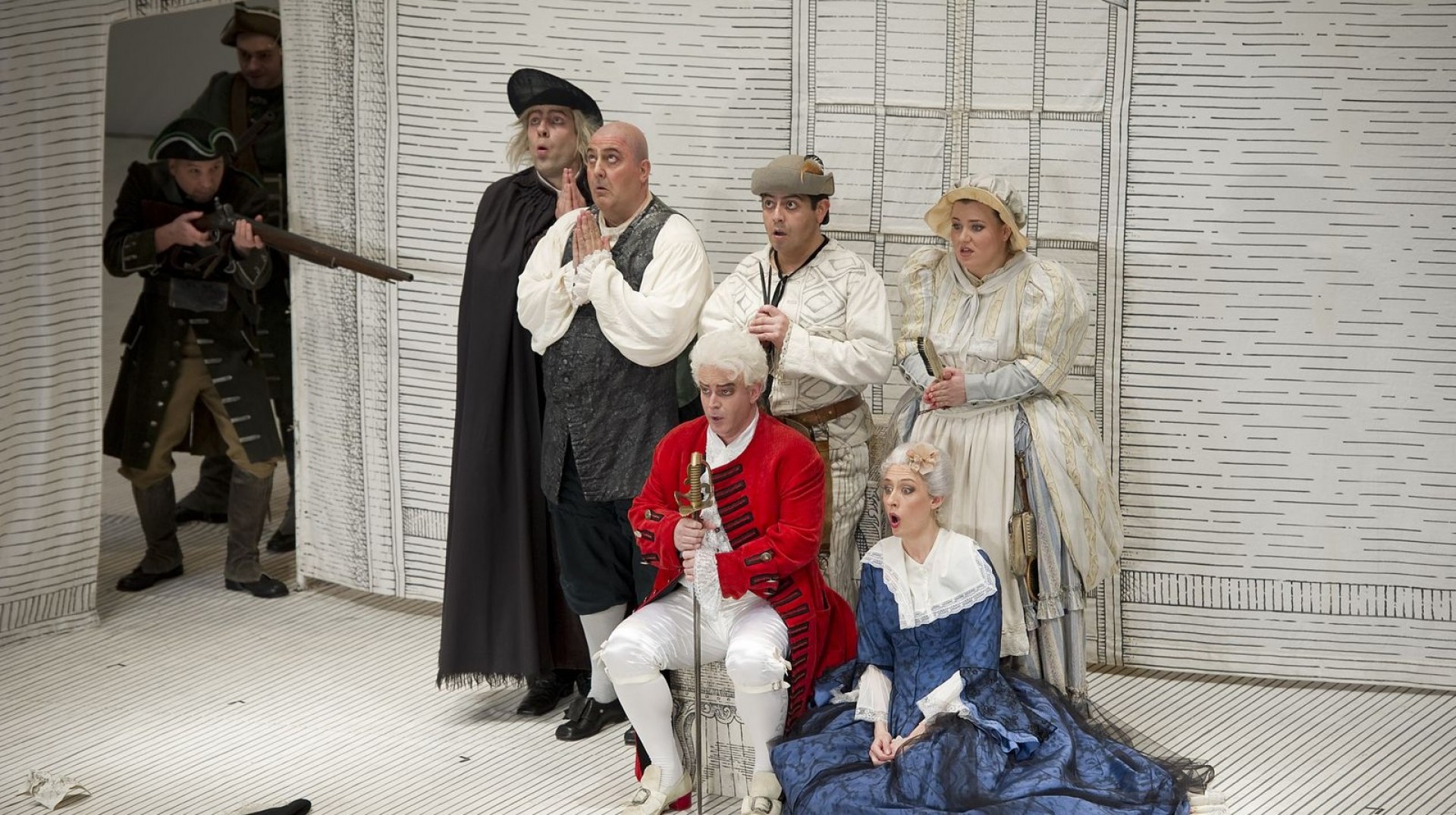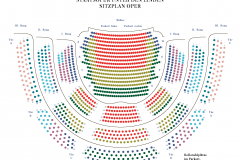The Barber of Seville
Mo | Tu | We | Th | Fr | Sa | Su |
The Barber of Seville
Commedia in two acts (1816)
Music by Gioachino Rossini
Text by Cesare Sterbini after Pierre Augustin Caronde Beaumarchais
Duration: Approximately 2 hours 55 minutes, including one interval after Act One
Language: Italian, with German and English surtitles
Recommended age: 10 years and older
The wealthy Count Almaviva has won the heart of the beautiful Rosina under the pseudonym 'Lindoro'. But Rosina’s jealous guardian Dr Bartolo wishes to marry his ward himself and so tries to keep her suitors away. Fortunately, 'Lindoro' is helped by the cunning barber Figaro, who – more or less ingeniously – weaves a web of entanglements and masquerades.
The 23-year-old Rossini composed 'Il barbiere di Siviglia' in just three weeks. Witty, fiery and vibrant, it is a masterpiece of Italian opera buffa, in which, as is so often the case, the old man in disguise hoodwinks everyone. Rossini was inspired by the 1772 play 'La Précaution inutile ou le Barbier de Séville' by the French poet, secret agent and arms smuggler Pierre-Augustin Caron de Beaumarchais, which tells the backstory of Mozart’s 'Le nozze di Figaro'. Rossini’s humorously drawn characters, the brilliant solo parts, rousing melodies and fast-paced ensembles fully unfold in Ruth Berghaus’s timeless production from 1968 (with young Achim Freyer’s innovatively simple stage design). Bursting with life and situation comedy, it has lost nothing of its youthful freshness and vitality after over 350 performances.
Synopsis
Place: Seville, Spain
Time: 17th century
Act 1
The square in front of Bartolo's house
In a public square outside Bartolo's house a band of musicians and a poor student named Lindoro are serenading, to no avail, the window of Rosina ("Ecco, ridente in cielo"; "There, laughing in the sky"). Lindoro, who is really the young Count Almaviva in disguise, hopes to make the beautiful Rosina love him for himself – not his money. Almaviva pays off the musicians who then depart, leaving him to brood alone. Rosina is the young ward of the grumpy, elderly Bartolo and she is allowed very little freedom because Bartolo plans to marry her once she is of age and thus appropriate her considerable dowry.
Figaro approaches singing (Aria: "Largo al factotum della città"; "Make way for the factotum of the city"). Since Figaro used to be a servant of the Count, the Count asks him for assistance in helping him meet Rosina, offering him money should he be successful in arranging this (duet: "All'idea di quel metallo"; "At the idea of that metal"). Figaro advises the Count to disguise himself as a drunken soldier, ordered to be billeted with Bartolo, so as to gain entrance to the house. For this suggestion, Figaro is richly rewarded.
A room in Bartolo's house with four doors
The scene begins with Rosina's cavatina, "Una voce poco fa" ("A voice a little while ago"). (This aria was originally written in the key of E major, but it is sometimes transposed a semitone up into F major for coloratura sopranos to perform, giving them the chance to sing extra, almost traditional, cadenzas, sometimes reaching high Ds or even Fs.)
Knowing the Count only as Lindoro, Rosina writes to him because she is interested in getting to know him better. As she is leaving the room, Bartolo enters with the music teacher Basilio. Bartolo is suspicious of the Count, and Basilio advises that he be put out of the way by creating false rumours about him (this aria, "La calunnia è un venticello" – "Calumny is a little breeze" – is almost always sung a tone lower than the original D major).
When the two have gone, Rosina and Figaro enter. Figaro asks Rosina to write a few encouraging words to Lindoro, which she has actually already written. (Duet: "Dunque io son...tu non m'inganni?"; "Then I'm the one...you're not fooling me?"). Although surprised by Bartolo, Rosina manages to fool him, but he remains suspicious. (Aria: "A un dottor della mia sorte"; "To a doctor of my class").
Count Almaviva, disguised as a soldier and pretending to be drunk, enters the house and demands to be quartered there. In fear of the drunken man, Berta the housekeeper rushes to Bartolo for protection. Bartolo tells the "soldier" that he (Bartolo) has an official exemption which excuses him from the requirement to quarter soldiers in his home. Almaviva pretends to be too drunk and belligerent to understand, and dares Bartolo to brawl. While Bartolo searches his cluttered desk for the official document which would prove his exemption, Almaviva whispers to Rosina that he is Lindoro in disguise, and passes a love-letter to her. Bartolo suspiciously demands to know what is in the piece of paper in Rosina's hands, but she fools him by handing over her laundry list. Bartolo and the Count argue loudly. Basilio enters; then Figaro, who warns that the noise of the argument is rousing the whole neighborhood. Finally, the noise attracts the attention of the Officer of the Watch and his troops, who crowd into the room. Bartolo demands that the Officer arrest the "drunken soldier". The Officer starts to do so, but Almaviva quietly reveals his true identity to the Officer, and he (the Officer) backs off. Bartolo and Basilio are astonished and mystified; Figaro laughs quietly at them. (Finale: "Fredda ed immobile, come una statua"; "Cold and still, just like a statue"). The confusion intensifies and causes everyone to suffer headaches and auditory hallucinations ("Mi par d'esser con la testa in un'orrida fucina; dell'incudini sonore l'importuno strepitar"; "My head seems to be in a fiery forge: the sound of the anvils deafens the ear").
Act 2
A room in Bartolo's house with a piano
Count Almaviva again appears at the doctor's house, this time disguised as Don Alonso, a priest and singing tutor who is substituting for the supposedly ailing Basilio. To gain Bartolo's trust, Don Alonso tells him he has intercepted a note from Lindoro to Rosina, and says that Lindoro is a servant of Count Almaviva who has dishonorable intentions towards Rosina. While Almaviva pretends to give Rosina her singing lesson ("Contro un cor"; "Against a heart"), Figaro arrives to shave Bartolo. Not wanting to leave Rosina alone with the singing teacher, Bartolo insists Figaro shave him right there in the music room. Basilio suddenly appears for his scheduled music lesson, but he is bribed by a full purse from Almaviva and persuaded to leave again, with much discussion of how ill he looks. (Quintet: "Don Basilio! – Cosa veggo!"; "Don Basilio! – What do I see?"). Bartolo overhears the lovers conspiring, and angrily drives everybody away. Berta vents about the crazy household ("Il vecchiotto cerca moglie").
A room in Bartolo's house with a grille looking out onto the square.
Bartolo orders Basilio to have the notary ready to marry him to Rosina that evening. Basilio leaves and Rosina arrives. Bartolo shows Rosina the letter she wrote to "Lindoro" and persuades her that this is proof that Lindoro is merely a flunky of Almaviva and is toying with her at Almaviva's behest. Rosina believes the story and agrees to marry Bartolo.
During an instrumental interlude, the music creates a thunder storm to indicate the passage of time. Almaviva and Figaro climb up a ladder to the balcony and enter Rosina's room through a window. Rosina accuses Almaviva, whom she believes to be Lindoro, of betraying her. Almaviva reveals his identity and the two reconcile. While Almaviva and Rosina are enraptured by one another, Figaro keeps urging them to leave. Two people are heard approaching the front door. They are Basilio and the notary. The Count, Rosina, and Figaro attempt to leave by way of the ladder, but discover it has been removed. Using bribes and threats, Almaviva coerces the notary into marrying him to Rosina, with Basilio and Figaro as the legally required witnesses. Bartolo barges in, accompanied by the Officer and the men of the watch, but too late; the marriage is already complete. The befuddled Bartolo is pacified by being allowed to retain Rosina's dowry. The opera concludes with an anthem to love ("Amor e fede eterna, si vegga in noi regnar!"; "May love and faith eternally be seen to reign in us").
Program and cast
Musical Direction: Tim Fluch
Production: Ruth Berghaus
Set and Costumes: Achim Freyer
Chorus Rehearsal: Gerhard Polifka
Count Almaviva: Alasdair Kent (20 February 2026 & 22 February 2026); Siyabonga Maqungo (6 March 2026, 19 March 2026 & 21 March 2026)
Doctor Bartolo: Giulio Mastrototaro
Rosina: Marina Viotti (20 February 2026 & 22 February 2026); Tara Erraught (6 March 2026, 19 March 2026 & 21 March 2026)
Don Basilio: Alexander Tsymbalyuk
Berta: Adriane Queiroz
Figaro: Jaka Mihelač (20 February 2026 & 22 February 2026); Gyula Orendt (6 March 2026, 19 March 2026 & 21 March 2026)
Fiorillo: Hanseong Yun
Ambrosio: Florian Eckhardt
Staatsopernchor, Staatskapelle Berlin
State Opera Unter den Linden
Staatsoper Unter den Linden is one of Berlin's most prestigious opera houses, with a rich history and significant cultural impact.
History:
The Staatsoper Unter den Linden was originally built between 1741 and 1743, under the direction of architect Georg Wenzeslaus von Knobelsdorff. It was commissioned by Frederick II of Prussia and was initially named the Königliche Oper (Royal Opera). The opera house has undergone several renovations and reconstructions, notably after World War II damage. It reopened in 1984, following a major renovation.
Construction:
The original design was characterized by its Baroque style, featuring an elegant façade and a grand entrance. The building was reconstructed in the 1950s and 1980s, maintaining its classical exterior while modernizing the interior. The façade features a classic portico with six Corinthian columns and a prominent central pediment.
Interior:
The interior is known for its opulent and classical design. The auditorium is renowned for its acoustics and grandeur, with luxurious velvet seats and elaborate decorations. The stage and seating areas have been updated to meet modern performance standards while preserving historical aesthetics.
Concerts and Performances:
The Staatsoper Unter den Linden hosts a variety of performances, including operas, orchestral concerts, and ballet. It is home to the Staatskapelle Berlin, one of Germany's leading orchestras. The opera house is celebrated for its high-quality productions and its role in Berlin’s vibrant cultural scene.
JOURNEY
The Staatsoper Unter den Linden has completely barrier-free access due to its excellent public transport connections.
ADDRESS: Unter den Linden 7; 10117 Berlin
SUBURBAN RAILWAY
S+U Friedrichstraße (S1, S2, S5, S7, S25, S75)
SUBWAY
Hausvogteiplatz (U2)
Museumsinsel (U5)
Stadtmitte (U2, U6)
Unter den Linden (U5, U6)
BUS
Staatsoper (100, 245, 300)
Unter den Linden/Friedrichstraße (100, 147, 245, 300, N6)
PARKING
Q-PARK parking garage Unter den Linden/Staatsoper
Bebelplatz, 10117 Berlin
There are five electric charging stations in the parking garage. Further information can be found here.
The underground car park on Bebelplatz offers disabled parking spaces and direct access to the opera house. On entering the car park between 5.30pm and 11.30pm, the maximum parking fee is €7. To use this tariff, enter your parking ticket in one of the pay machines and the message »Theatertarif« will appear on the display. Please note that it is not possible to use the tariff if you enter the car park before 5.30pm. so it will not be shown on the display. TIP: If you pay the theatre tariff at the pay machine before the event, you can avoid unnecessary waiting after the show.

 EN
EN DE
DE IT
IT FR
FR ES
ES RU
RU JP
JP RO
RO
 Seating plan
Seating plan 